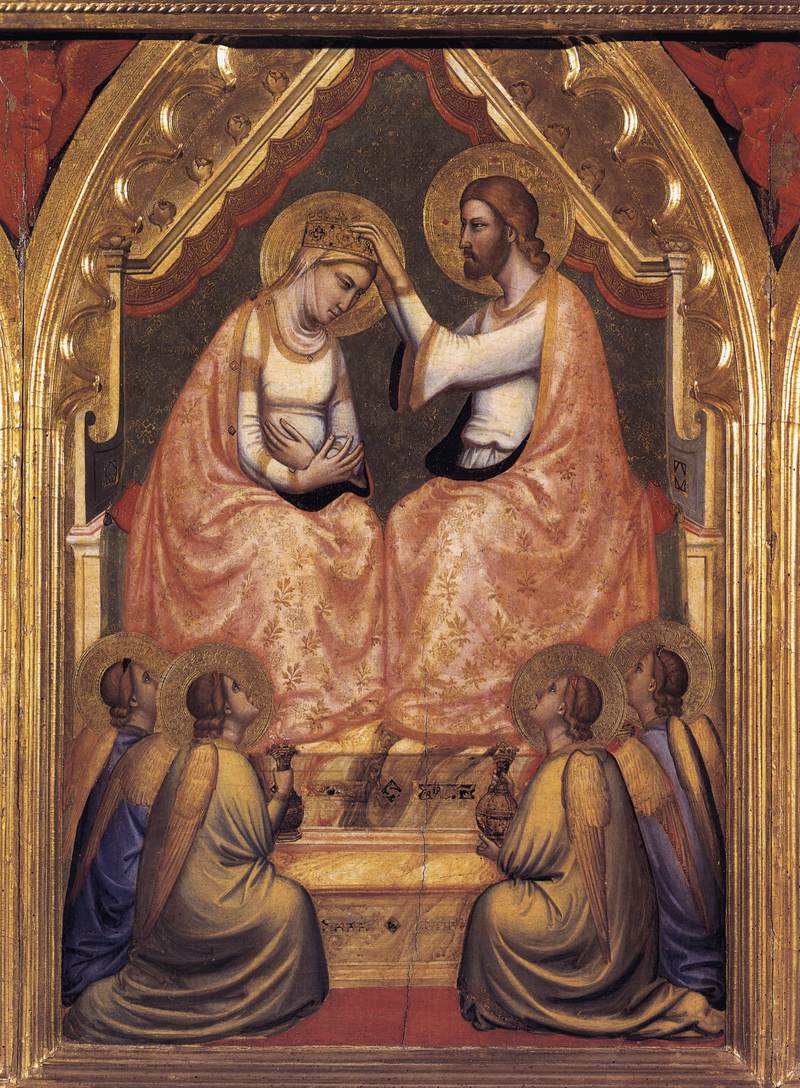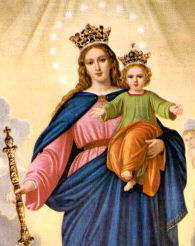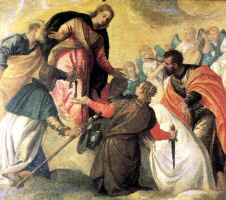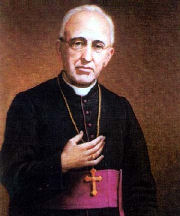1. And he arose from thence, and comes into the coasts of Judea by the farther Side of Jordan: and the people resort to him again; and, as he was wont, he taught them again.
2. And the Pharisees came to him, and asked him, Is it lawful for a man to put away his wife? tempting him.
3. And he answered and said to them, What did Moses command you?
4. And they said, Moses suffered to write a bill of divorcement, and to put her away.
5. And Jesus answered and said to them, For the hardness of your heart he wrote you this precept.
6. But from the beginning of the creation God made them male and female.
7. For this cause shall a man leave his father and mother, and cleave to his wife.
8. And they two shall be one flesh: so then they are no more two, but one flesh.
9. What therefore God has joined together, let not man put asunder.
10. And in the house his disciples asked him again of the same matter.
11. And he said to them, Whoever shall put away his wife, and marry another, commits adultery against her.
12. And if a woman shall put away her husband and be married to another, she commits adultery.
BEDE; Up to this time Mark had related what our Lord said and did in Galilee; here he begins to relate what He did, taught, or suffered in Judea, and first indeed across the Jordan on the east; and this is what is said in these words: And he arose from thence, and comes into the coasts of Judea, by the farther side of Jordan; then also on this side Jordan, when He came to Jericho, Bethany, and Jerusalem. And though all the province of the Jews is generally called Judea, to distinguish it from other nations, more especially, however, its southern portion was called Judea, to distinguish it from Samaria, Galilee, Decapolis, and the other regions in the same province.
THEOPHYL. But He enters the region of Judea, which the envy of the Jews had often caused Him to leave, because His Passion was to take place there. He did not, however, then go up to Jerusalem, but to the confines of Judea, that He might do good to the multitudes, who were not evil; for Jerusalem was, from the malice of the Jews, the worker of all the wickedness. Wherefore it goes on: And the people resort to him again, and, as he was wont, he taught them again.
BEDE; Mark the difference of temper in the multitude and in the Pharisees. The former meet together, in order to be taught, and that their sick may be healed, as Matthew relates; the latter come to Him, to try to deceive their Savior by tempting Him. Wherefore there follows, And the Pharisees came to him, and asked him, Is it lawful for a man to put away his wife? tempting Him.
THEOPHYL. They come to Him indeed, and do not quit Him, lest the multitudes should believe on Him; and by continually coming to Him, they thought to bring Him into difficulty, and to confuse Him by their questions. For they proposed to Him a question, which had on either side a precipice, so that whether He said that it was lawful for a man to put away his wife, or that it was not lawful, they might accuse Him, and contradict what He said, out of the doctrines of Moses. Christ, therefore, being Very Wisdom, in answering their question, avoids their snares.
CHRYS. For being asked, whether it is lawful, he does not immediately reply, it is not lawful, lest they should raise an outcry, but He first wished them to answer Him as to the sentence of the law, that they by their answer might furnish Him with what it was right to say. Wherefore it goes on, And he answered and said to them, What did Moses command you?
And afterwards, And they said, Moses suffered to write a bill of divorcement, and to put her away. They put forward indeed this that Moses had said either on account of the question of our Savior, or wishing to excite against Him a multitude of men. For divorce was an indifferent thing among the Jews, and all practiced it, as though it were permitted by the law.
AUG. It makes nothing, however, to the truth of the fact, whether, as Matthew says, they themselves addressed to the Lord the question concerning the bill of divorcement, allowed to them by Moses, on our Lord's forbidding the separation, and confirming His sentence from the law, or whether it was in answer to a question of His, that they said this concerning the command of Moses, as Mark here says. For His wish was to give them no reason why Moses permitted it, before they themselves had mentioned the fact; since then the wish of the parties speaking, which is what the words ought to express, is in either way shown, there is no discrepancy, though there be a difference in the way of relating it. It may also be meant that, as Mark expresses it, the question put to them by the Lord, What did Moses command? was in answer to those who had previously asked His opinion concerning the putting away of a wife; and when they had replied that Moses permitted them to write a bill of divorcement, and to put her away, His answer was concerning that same law, given by Moses, how God instituted the marriage of a male, and a female, saying those things which Matthew relates; on hearing which they again rejoined what they had replied to Him when He first asked them, namely, Why then did Moses command?
AUG. Moses, however, was against a man's dismissing his wife, for he interposed this delay, that a person whose mind was bent on separation, might be deterred by the writing of the bill, and desist; particularly, since, as is related, among the Hebrews, no one was allowed to write Hebrew characters but the scribes. The law therefore wished to send him, whom it ordered to give a bill of divorcement, before he dismissed his wife, to them, who ought to be wise interpreters of the law, and just opponents of quarrel. For a bill could only be written for him by men, who by their good advice might overrule him, since his circumstances and necessity had put him into their bands, and so by treating between him and his wife they might persuade them to love and concord. But if a hatred so great had arisen that it could not be extinguished and corrected, then indeed a bill was to be written, that he might not lightly put away her who was the object of his hate, in such a way as to prevent his being recalled to the love, which he owed her by marriage, through the persuasion of the wise. For this reason it is added, For the hardness of your heart, he wrote this precept; for great was the hardness of heart which could not be melted or bent to the taking back and recalling the love of marriage, even by the interposition of a bill in a way which gave room for the just and wise to dissuade them.
PSEUDO-CHRYS. Or else, it is said, For the hardness of your hearts, because it is possible for a soul purged from desires and from anger to bear the worst of women; but if those passions have a redoubled force over the mind, many evils will arise from hatred in marriage. Thus then, He saves Moses, who had given the law, from their accusation, and turns the whole upon their head. But since what He had said was grievous to them, He at once brings back the discourse to the old law, saying, But from the beginning of the creation, God made them male and female.
BEDE; He says not male and females, which the sense would have required had it referred to the divorce of former wives, but male and female, so that they might be bound by the tie of one wife.
CHRYS. If however he had wished one wife to be put away and another to be brought in, He would have created several women. Nor did God only join one woman to one man, but He also bade a man quit his parents and cleave to his wife. Wherefore it goes on: And he said, (that is, God said by Adam,) For this cause shall a man leave his father and mother, and cleave to his wife. From the very mode of speech, showing the impossibility of severing marriage, because He said, He shall cleave.
BEDE; And in like manner, because He says, he shall cleave to his wife, not wives. It goes on: And they two shall be one flesh.
CHRYS. Being framed out of one root, they will join into one body. It goes on: So then they are no more two, but one flesh.
BEDE; The reward then of marriage is of two to become one flesh. Virginity being joined to the Spirit, becomes of one spirit.
CHRYS. After this, bringing forward an awful argument, He said not, do not divide, but He concluded, What therefore God has joined together, let not man put asunder.
AUG. Behold the Jews are convinced out of the books of Moses, that a wife is not to be put away, while they fancied that in putting her away, they were doing the will of Moses. In like manner from this place, from the witness of Christ Himself, we know this, that God made and joined male and female, for denying which the Manichees are condemned, resisting now not the books of Moses, but the Gospel of Christ.
BEDE; What therefore God has conjoined by making one flesh of a man and a woman, that man cannot separate, but God alone. Man separates, when we dismiss the first wife because we desire a second; but it is God who , separates, when by common consent, for the sake of serving God, we so have wives as though we had none.
CHRYS. But if two persons, whom God has joined together, are not to be separated; much more is it wrong to separate from Christ, the Church, which God has joined to Him.
THEOPHYL. But the disciples were offended, as not being fully satisfied with what had been said; for this reason they again question Him, wherefore there follows, And in the house, his disciples asked him again of the same matter.
PSEUDO-JEROME; This second question is said to be asked again by the Apostles, because it is on the subject of which the Pharisees had asked Him, that is, concerning the state of marriage; and this is said by Mark in his own person.
GLOSS. For a repetition of a saying of the Word, produces not weariness, but thirst and hunger; wherefore it is said, They that eat me shall yet be hungry, and they that drink me shall yet be thirsty; for the tasting of the honeyed words of wisdom yields all manner of savor to them who love her. Wherefore the Lord instructs His disciples over again; for it goes on, And he said to them, Whoever shall put away his wife and marry another, commits adultery upon her.
PSEUDO-CHRYS. The Lord calls by the name of adultery cohabitation with her who is not a man's wife; she is not, however, a wife, whom a man has taken to him, after quitting his first; and for this reason he commits adultery upon her, that is, upon the second, whom he brings in. And the same thing is true in the case of the woman; wherefore it goes on, And if a woman shall put away her husband, and marry another, she commits adultery; for she cannot be joined to another as her own husband, if she leave him who is really her own husband. The law indeed forbade what was plainly adultery; but the Savior forbids this, which was neither plain, nor known to all, though it was contrary to nature.
BEDE; In Matthew it is more fully expressed, Whoever shall put away his wife, except it be for fornication. The only carnal cause then is fornication; the only spiritual cause is the fear of God, that a man should put away his wife to enter into religion, as we read that many have done. But there is no cause allowed by the law of God for marrying another, during the lifetime of her who is quitted.
PSEUDO-CHRYS. There is no contrariety in Matthew's relating that He spoke these words to the Pharisees, though Mark says that they were spoken to the disciples; for it is possible that He may have spoken them to both.
13. And they brought young children to him, that he should touch them: and his disciples rebuked those that brought them.
14. But when Jesus saw it, he was much displeased, and said to them, Suffer the little children to come to me, and forbid them not: for of such is the kingdom of God.
15. Truly I say to you, Whoever shall not receive the kingdom of God as a little child, he shall not enter therein.
16. And he took them up in his arms, put his hands upon them, and blessed them.
THEOPHYL. The wickedness of the Pharisees in tempting Christ, has been related above, and now is shown the great faith of the multitude, who believed that Christ conferred a blessing on the children whom they brought to Him, by the mere laying on of His hands. Wherefore it is said: And they brought young children to him, that he might touch them.
CHRYS. But the disciples, out of regard for the dignity of Christ, forbade those who brought them. And this is what is added: And his disciples rebuked those who brought them. But our Savior; in order to teach His disciples to be modest in their ideas, and to tread under foot worldly pride, takes the children to Him, and assigns to them the kingdom of God: wherefore it goes on: And he said to them, Suffer little children to come to me, and forbid them not
ORIGEN; If any of those who profess to hold the office of teaching in the Church should see a person bringing to them some of the foolish of this world, and low born, and weak, who for this reason are called children and infants, let him not forbid the man who offers such an one to the Savior, as though he were acting without judgment. After this He exhorts those of His disciples who are already grown to full stature to condescend to be useful to children, that they may become to children as children, that they may gain children; for He Himself, when He was in the form of God, humbled Himself, and became a child. On which He adds: For of such is the kingdom of heaven.
CHRYS. For indeed the mind of a child is pure from all passions, for which reason, we ought by free choice to do those works, which children have by nature.
THEOPHYL. Wherefore He says not, for of these, but of such is the kingdom of God, that is, of persons who have both in their intention and their work the harmlessness and simplicity which children have by nature. For a child does not hate, does nothing of evil intent, nor though beaten does he quit his mother; and though she does him in vile garments, prefers them to kingly apparel; in like manner he, who lives according to the good ways of his mother the Church, honors nothing before her, nay, not pleasure, which is the queen of many; wherefore also the Lord subjoins, Truly I say to you, Whoever shall not receive the kingdom of God as a little child, he shall not enter therein.
BEDE; That is, if you have not innocence and purity of mind like that of children, you cannot enter into the kingdom of heaven. Or else, we are ordered to receive the kingdom of God, that is, the doctrine of the Gospel, a little child, because as a child, when he is taught, does not contradict his teachers, nor put together reasonings and words against them, but receives with faith what they teach, and obeys them with awe, so we also are to receive the word of the Lord with simple obedience, and without any gainsaying. It goes on: And he took them up in his arms, put his hands upon them, and blessed them.
PSEUDO-CHRYS. Fitly does He take them up into His arms to bless them, as it were, lifting into His own bosom , and reconciling Himself to His creation, which in the beginning fell from Him, and was separated from Him. Again, He puts His hands upon the children, to teach us the working of His divine power; and indeed, He puts His hands upon them, as others are wont to do, though His operation is not as that of others, for though He was God, He kept to human ways of acting, as being very man.
BEDE; Having embraced the children, He also blessed them, implying that the lowly in spirit are worthy of His blessing, grace, and love.
Catena Aurea Mark 10


 In 1571 the whole of Christendom was saved by Mary Help of Christians when faithful Catholics throughout Europe prayed the Rosary. The great battle of Lepanto occurred on October 7th 1571. For this reason this date has been chosen as the feast of the Holy Rosary. In 1573 Pope Pius V instituted the feast in thanksgiving for the decisive victory of Christianity over Islamism.
In 1571 the whole of Christendom was saved by Mary Help of Christians when faithful Catholics throughout Europe prayed the Rosary. The great battle of Lepanto occurred on October 7th 1571. For this reason this date has been chosen as the feast of the Holy Rosary. In 1573 Pope Pius V instituted the feast in thanksgiving for the decisive victory of Christianity over Islamism.  In 1809, Napoleon's men entered the Vatican, arrested Pius VII and brought him in chains to Grenoble, and eventually Fontainbleau. His imprisonment lasted five years. The Pope smuggled out orders from prison for the whole of Christendom to pray to Our Lady Help of Christians, and thus the whole of Europe once again became a spiritual battle ground, not of arms against ruthless arms, but of Rosaries against ruthless military might. Soon Napoleon was off the throne and the Pope freed from prison.
In 1809, Napoleon's men entered the Vatican, arrested Pius VII and brought him in chains to Grenoble, and eventually Fontainbleau. His imprisonment lasted five years. The Pope smuggled out orders from prison for the whole of Christendom to pray to Our Lady Help of Christians, and thus the whole of Europe once again became a spiritual battle ground, not of arms against ruthless arms, but of Rosaries against ruthless military might. Soon Napoleon was off the throne and the Pope freed from prison.  Born and baptised at Becanour on the first of April 1824, the future saint was the fifth of thirteen children from the marriage Louis-Zephirin Moreau and Marquerite Champoux-Saint-Pair. This "intelligent, pious, modest, gentle, and thoughtful" child was educated in his native parish until the age of fifteen before being admitted into the Seminary of Nicolet. In 1844, he received the ecclesiastic habit at Quebec, but in 1845, Msgr Signay sent him back home, because he found him to be in fragile health. It would take more than this setback to discourage the young man on his path towards the priesthood. He then begged Msgr Bourget to permit him to achieve his dream at the Ecole de theology of Montreal. This was accomplished, thanks to the kindness of Msgr Prince, head of this institution. Father Moreau was ordained a priest on Dec. 19, 1846. at the age of 22. Six years later, Msgr Prince became the first titular of the new diocese of Saint-Hyacinthe and he appointed Father Moreau as secretary-chancellor. The apprenticeship of the future prelate was as parish priest for the cathedral, and he was administrator of the diocese five times. On Jan 15 1876, at the age of 51, Father Moreau became the fourth bishop of Saint Hyacinth.
Born and baptised at Becanour on the first of April 1824, the future saint was the fifth of thirteen children from the marriage Louis-Zephirin Moreau and Marquerite Champoux-Saint-Pair. This "intelligent, pious, modest, gentle, and thoughtful" child was educated in his native parish until the age of fifteen before being admitted into the Seminary of Nicolet. In 1844, he received the ecclesiastic habit at Quebec, but in 1845, Msgr Signay sent him back home, because he found him to be in fragile health. It would take more than this setback to discourage the young man on his path towards the priesthood. He then begged Msgr Bourget to permit him to achieve his dream at the Ecole de theology of Montreal. This was accomplished, thanks to the kindness of Msgr Prince, head of this institution. Father Moreau was ordained a priest on Dec. 19, 1846. at the age of 22. Six years later, Msgr Prince became the first titular of the new diocese of Saint-Hyacinthe and he appointed Father Moreau as secretary-chancellor. The apprenticeship of the future prelate was as parish priest for the cathedral, and he was administrator of the diocese five times. On Jan 15 1876, at the age of 51, Father Moreau became the fourth bishop of Saint Hyacinth.